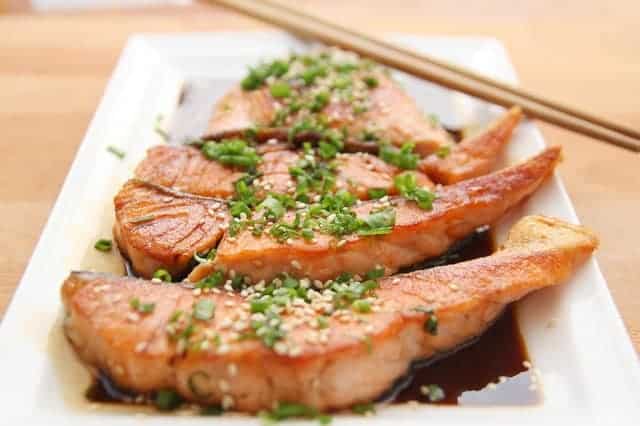The hypothyroidism diet is not too strict or complicated and implementing it should not be much of a problem. If you are struggling with hypothyroidism, modify your eating plan as soon as possible. This may be the key to improving your thyroid function, and thus preventing many of the unpleasant symptoms you deal with on a daily basis. We give you the basic rules of diet in hypothyroidism. See what to eat and what to avoid in order to improve the functioning of the gland.
Table of contents
Importance of diet in hypothyroidism
In hypothyroidism, we are dealing with disturbed hormonal economy, which results in a number of symptoms, including slowed metabolism, problems with digestion, weight gain, difficulty concentrating, chronic fatigue and sleepiness, deterioration of hair and skin. Depending on the specific case, the treatment of hypothyroidism may proceed with or without the assistance of pharmacological agents.
Regardless of whether we take medication for hypothyroidism or not, we should introduce a special diet, as it is crucial for the efficiency of the thyroid gland. Some nutrients, such as iodine, copper, and the amino acid tyrosine, uniquely support the functioning of the thyroid gland and stimulate it to produce hormones, thereby inhibiting the symptoms of hypothyroidism, including weight gain. Other ingredients, such as vitamin D, counter inflammation and stimulate the immune system, which benefits thyroid health.
On the other hand, there are many foods that are extremely bad for the thyroid (for example, processed foods), slow it down, interfere with the absorption of iodine and other important components, lower the immune system, and disrupt hormone management. So it is worth to get acquainted with the list of recommended and inappropriate products in the hypothyroid diet, and on this basis create a new menu.
Here are the nutrients which are particularly important for hypothyroid patients:
- iodine;
- zinc and selenium;
- copper;
- iron;
- B vitamins;
- vitamin D;
- vitamin C;
- vitamin A;
- vitamin E;
- complete protein;
- omega 3 unsaturated fatty acids.
Hypothyroidism diet – what to eat?

Products recommended for people struggling with hypothyroidism are:
- lean meat (it contains easily digestible protein rich in amino acids valuable to the thyroid gland, including tyrosine);
- sea fish, e.g. herring, sardine, mackerel, halibut, cod, salmon, hake (rich in iodine, omega 3 acids, complete protein, vitamin D, selenium)
- seafood (rich in iodine, vitamin D and protein);
- lean dairy products, e.g. buttermilk, natural yogurt, kefir, cottage cheese (source of protein and probiotic bacteria valuable for maintaining proper thyroid function);
- eggs (rich in complete protein, vitamin D, vitamin A, B vitamins);
- cerealflakes and bran, groats, wholemeal bread (source of zinc, iron, B vitamins);
- legumes such as green peas and chickpeas (contain B vitamins, vitamin A, vitamin E, zinc and selenium, iron)
- seeds and seeds, walnuts, Brazil nuts (contain zinc, selenium, copper, vitamin E);
- Linseed oil, olive oil (source of valuable unsaturated fatty acids);
- vegetables such as: tomatoes, peppers, zucchini, carrots, beets, garlic, leafy vegetables (source of dietary fiber, vitamin C, vitamin A);
- fruits, e.g. citrusfruits, apples, bananas, currants (rich in antioxidants, enzymes, vitamins).
Mineral waters are also an important component of the diet in hypothyroidism. It is best to drink them in the amount of about 1.5-2 l a day. It is also a good idea to reach for dietary supplements supporting the thyroid. The most effective supplements are those which are based on iodine-rich algae and contain additional ingredients which improve the functioning of the gland (e.g. Thyrolin).
When following a thyroid supporting diet, it is also worth paying attention to the way you eat. You should eat 5-6 not too large meals a day, keeping a distance of about 3 hours between them. Such intervals are a way to avoid the feeling of hunger, drops in blood sugar levels and slowing down of metabolism.
What should I avoid in my hypothyroidism diet?
Certain foods can weaken thyroid activity, exacerbate hypothyroid symptoms and increase autoimmune processes. Here are foods to avoid:
- processed foods;
- fast foods;
- sweets and salty snacks;
- white bread, white flour products;
- cabbage;
- Brussels sprouts;
- turnips;
- kohlrabi;
- broccoli;
- cauliflower;
- kale;
- soybeans;
- alcohol;
- coloured sweet drinks.
Day 1
- Breakfast: oatmeal with banana and cinnamon
- 2nd breakfast: whole wheat bread sandwiches with mackerel and cottage cheese paste
- Dinner: chili con carne with ground turkey, brown rice
- Tea time: smoothie with citrus, kiwi and pumpkin seeds
- Dinner: chicken ham sandwich, cottage cheese with cucumber
Day 2
- Breakfast: omelette with tomatoes
- 2nd breakfast: toast with brie cheese, grapefruit
- Dinner: porridge with mushrooms
- Tea time: cream of green peas sprinkled with roasted sunflower seeds
- Dinner: salad with shrimps, wholemeal bread
Day 3
- Breakfast: graham with smoked salmon, paprika and dill
- 2 breakfast: smoothie made of buttermilk, fruit and bran
- Dinner: one-pot dish with tomatoes, courgette, peppers, onion, garlic, diced chicken breast, wholemeal toast or wholemeal pasta
- Tea time: cottage cheese with raisins, sunflower seeds, honey and linseed
- Dinner: sandwiches with egg paste, salad with pickled cucumber, onion and pepper
Day 4
- Breakfast: millet with dried cranberries, walnuts and sesame
- 2 breakfast: wholemeal bread sandwiches with blue cheese and olives
- Dinner: cream of pumpkin soup, baked fish with vegetables served with brown rice
- Tea time: ham rolls with vegetable and cottage cheese filling
- Dinner: light stew of pork loin or pork shoulder and mushrooms
You may be interested in:
- Hashimoto disease – symptoms, treatment, diet
- Thyroid diseases

